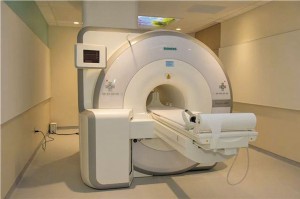High tech access available for mental health research
By Lookout on Jun 06, 2016 with Comments 0

Photo by MCpl Pat Blanchard, Canadian Forces Combat Camera
The Positron Emission Tomography – functional Magnetic Resonance Imaging (PETfMRI) machine to be used in mental health research.
Peter Mallett, Staff Writer ~
A new investment in cutting-edge technology is poised to assist the Canadian Armed Forces (CAF) in mental health research and better military member support.
DND and the Royal Ottawa Mental Health Centre announced May 16 a four-year $2.65 million agreement for DND to access their brain imaging scanning equipment.
The Centre recently installed a PET/fMRI scanner, the only one of its kind in Canada devoted entirely to brain and mental health research.
“I see this as a key investment in helping our Canadian Armed Forces members and veterans who are fighting to overcome mental health issues,” said General Jonathan Vance, Chief of Defence Staff.
“This partnership will see experts at The Royal Ottawa Mental Health Centre and our military mental health professionals working together towards a common goal of developing a new understanding of the effects of mental illness on brain functions.”
The cutting edge technology will allow clinicians and scientists from Canadian Forces Health Services and Royal Ottawa Mental Health Centre to examine the effects of various drugs used to treat depression, post-traumatic stress disorder and other mental illnesses on brain functions.
The CAF’s Director of Mental Health, Col Andrew Downes says the introduction of the scanner is a breakthrough for researchers because it combines two widely used pieces of technology into one device, offering a more accurate measurement or snapshot of a patient’s brain.
The PET, or Positron Emission Tomography, identifies parts of the brain that are metabolically active using specially labeled molecules; while fMRI is a technique for measuring brain activity by detecting changes in blood oxygenation that occur in response to neural activity.
“For researchers across the globe mental illness is currently a poorly understood entity and treatment has a lot of subjectivity,” said Col Downes.
“We are hoping this innovation will shed light on what is going on at the structural and molecular level of the brain. When we better understand how the brain functions at these levels it will lead to new treatment.”
The introduction of new brain imaging technology comes on the heels of a Nov. 10, 2015, call to action by Gen Vance on mental health and suicide prevention.
In his statement, Gen Vance pledged to “continually strive to improve” suicide prevention programs in the wake of a Surgeon General Report that highlighted inflated suicide rates of deployed CAF personnel.
Suicide research will be one of the first tasks in which the scanner will be used says Col Downs.
Filed Under: Top Stories
About the Author:





